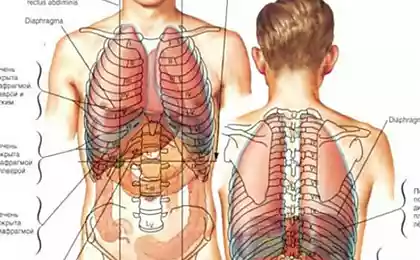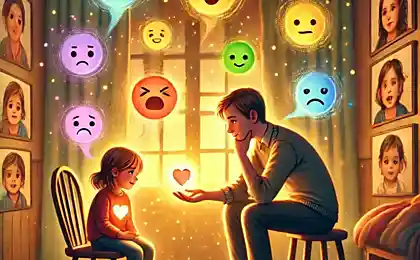230
Regulator of own borders: why not suppress anger
A very important feeling (not to be confused with anger and evil as a concept).
Where it is suppressed for a long time, there is lost access to the energy of desires. (I don’t know what I want), there over time there are experiences “I don’t know who I am, I don’t know what I am”, there appear a variety of sores, if it is long and very carefully suppressed.
There are uncontrolled outbreaks of anything. Total guilt (read - anger directed at yourself), there can be depression, there is an inner critic who settles in the head with a fat troll and every step devalues, questions his own goodness and that would not collapse from this all, there are projections into the outside world - all people become shit, the weather too, and in general many things immediately become shit and injustice.
Where anger is suppressed, there are constant resentments. You can cry endlessly in the pillow at night, or walk with an often sore throat.

Anger is different.
It can be like protecting the valuable.
It’s a sign that I’m not taking responsibility for my life. Believing that others should do what I think is just and right, that others should know what I mean even when I don’t say it directly.
But anyway. Anger is the regulator of one’s own boundaries..
Where anger is suppressed, there is no clarity in experiencing one’s own boundaries. He throws it in violation of strangers, then in excessive bending of his own.
Anger is often called a “negative feeling” and it is often believed that being angry is bad, stupid, meaningless, wrong, unrighteous.
And I think the whole point is that Expressing anger is a whole skill that few people learn.. Anger is often considered dangerous – dangerous for relationships, dangerous for others to evaluate (what will people think of me?). I want to be “good” in other people’s eyes... and in general there is a whole locomotive that can reach for it.
Anger is a person's teeth.
They can chew what is useful.
They can protect themselves.
They can express themselves.
The question is not whether to be angry or suppress your anger.The question is how to express your anger..

When I worked with children, it was a revelation for many of them that their anger can be expressed by the words “I’m angry right now”, “When you take away my toy or destroy my buildings, spoil my drawings, I’m angry, it’s unpleasant for me, please don’t do this, otherwise I will distance myself from you / will fight with you / will not trust you”.
Before that, the only way to protect himself and express anger was to take the toy, spoil the picture in return, hit, call, throw a tantrum, and once, the boy endured, and then took a knife and threw himself at his abuser.
Parents, who were never taught to express their anger, grabbed their hearts, felt shame, shouted at their children, made them stop it = suppress their anger. What would people think?
Few people have taught us to recognize our anger: “You’re angry right now because Vanya took your toy.” You have the right to be angry and say, ‘I’m angry and I don’t want you to take the toy back.’ Don’t beat Vanya, it hurts. But you can take care of yourself by labeling yourself and warning you what you will do if Vanya doesn’t hear you and keeps going.
Or, “You’re angry right now because you want to keep playing, but it’s time to finish the game.” I see you angry. But you don’t have to beat me for it, it hurts me and I won’t let myself be hit. You can talk about your anger and feel it. I see you don't want to finish the game. But those are the rules, there's nothing you can do. We have to leave, no matter how hard it is.
Anger is a way to understand yourself. A way to feel your importance, yourself.
Anger is always a marker of something important. And, as a rule, is a wrapper for deeper feelings and experiences. But without realizing anger, it's like throwing out boxes of this wrapper called anger, not knowing what's inside those boxes. And there are often jewels called “my values.” By allowing ourselves to feel angry while living it, we remove these wrappers, exploring what is wrapped in them.
Living the anger It is not the same to punch in the face, insult, destroy everything around you. Living anger means staying in touch with that feeling, giving it space for as long as it needs. Take care of your safety and the environment.

Insulting a person and labeling yourself “I’m angry when you do that” or “I’m angry at you right now and ready to keep talking when I’m calm” are completely different things.
Iso in the first case (in insults) Excitement overwhelms, on which actions are performed, which can be regretted by “sobering up” from anger.
In the second case, There is a clear designation of oneself and a space for oneself to mature anger into some other quality. For example, in the realization of the value of not being allowed to offend yourself. Or in the experience of regret that it is very sad that everything did not happen as I wanted. Or experience the value of a relationship with that person. Or the realization that, in fact, under this anger lives one's own fear or vulnerability.
Also interesting: Remarkable anger
How to Never Be Angry: 3 Tips From Neuroscientists
Anger is a loyal dog who is always on guard for the safety and values of his master. It is important to tame, make friends with this dog.
P. S. And yes, by the way, where anger is suppressed, there is fertile ground for dependent relationships.
Author: Alyayeva Ksenia
P.S. And remember, just by changing your consciousness – together we change the world!
Source: alyaeva.livejournal.com/90861.html
Where it is suppressed for a long time, there is lost access to the energy of desires. (I don’t know what I want), there over time there are experiences “I don’t know who I am, I don’t know what I am”, there appear a variety of sores, if it is long and very carefully suppressed.
There are uncontrolled outbreaks of anything. Total guilt (read - anger directed at yourself), there can be depression, there is an inner critic who settles in the head with a fat troll and every step devalues, questions his own goodness and that would not collapse from this all, there are projections into the outside world - all people become shit, the weather too, and in general many things immediately become shit and injustice.
Where anger is suppressed, there are constant resentments. You can cry endlessly in the pillow at night, or walk with an often sore throat.

Anger is different.
It can be like protecting the valuable.
It’s a sign that I’m not taking responsibility for my life. Believing that others should do what I think is just and right, that others should know what I mean even when I don’t say it directly.
But anyway. Anger is the regulator of one’s own boundaries..
Where anger is suppressed, there is no clarity in experiencing one’s own boundaries. He throws it in violation of strangers, then in excessive bending of his own.
Anger is often called a “negative feeling” and it is often believed that being angry is bad, stupid, meaningless, wrong, unrighteous.
And I think the whole point is that Expressing anger is a whole skill that few people learn.. Anger is often considered dangerous – dangerous for relationships, dangerous for others to evaluate (what will people think of me?). I want to be “good” in other people’s eyes... and in general there is a whole locomotive that can reach for it.
Anger is a person's teeth.
They can chew what is useful.
They can protect themselves.
They can express themselves.
The question is not whether to be angry or suppress your anger.The question is how to express your anger..

When I worked with children, it was a revelation for many of them that their anger can be expressed by the words “I’m angry right now”, “When you take away my toy or destroy my buildings, spoil my drawings, I’m angry, it’s unpleasant for me, please don’t do this, otherwise I will distance myself from you / will fight with you / will not trust you”.
Before that, the only way to protect himself and express anger was to take the toy, spoil the picture in return, hit, call, throw a tantrum, and once, the boy endured, and then took a knife and threw himself at his abuser.
Parents, who were never taught to express their anger, grabbed their hearts, felt shame, shouted at their children, made them stop it = suppress their anger. What would people think?
Few people have taught us to recognize our anger: “You’re angry right now because Vanya took your toy.” You have the right to be angry and say, ‘I’m angry and I don’t want you to take the toy back.’ Don’t beat Vanya, it hurts. But you can take care of yourself by labeling yourself and warning you what you will do if Vanya doesn’t hear you and keeps going.
Or, “You’re angry right now because you want to keep playing, but it’s time to finish the game.” I see you angry. But you don’t have to beat me for it, it hurts me and I won’t let myself be hit. You can talk about your anger and feel it. I see you don't want to finish the game. But those are the rules, there's nothing you can do. We have to leave, no matter how hard it is.
Anger is a way to understand yourself. A way to feel your importance, yourself.
Anger is always a marker of something important. And, as a rule, is a wrapper for deeper feelings and experiences. But without realizing anger, it's like throwing out boxes of this wrapper called anger, not knowing what's inside those boxes. And there are often jewels called “my values.” By allowing ourselves to feel angry while living it, we remove these wrappers, exploring what is wrapped in them.
Living the anger It is not the same to punch in the face, insult, destroy everything around you. Living anger means staying in touch with that feeling, giving it space for as long as it needs. Take care of your safety and the environment.

Insulting a person and labeling yourself “I’m angry when you do that” or “I’m angry at you right now and ready to keep talking when I’m calm” are completely different things.
Iso in the first case (in insults) Excitement overwhelms, on which actions are performed, which can be regretted by “sobering up” from anger.
In the second case, There is a clear designation of oneself and a space for oneself to mature anger into some other quality. For example, in the realization of the value of not being allowed to offend yourself. Or in the experience of regret that it is very sad that everything did not happen as I wanted. Or experience the value of a relationship with that person. Or the realization that, in fact, under this anger lives one's own fear or vulnerability.
Also interesting: Remarkable anger
How to Never Be Angry: 3 Tips From Neuroscientists
Anger is a loyal dog who is always on guard for the safety and values of his master. It is important to tame, make friends with this dog.
P. S. And yes, by the way, where anger is suppressed, there is fertile ground for dependent relationships.
Author: Alyayeva Ksenia
P.S. And remember, just by changing your consciousness – together we change the world!
Source: alyaeva.livejournal.com/90861.html























